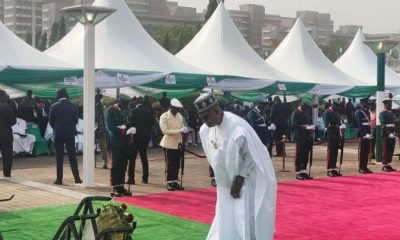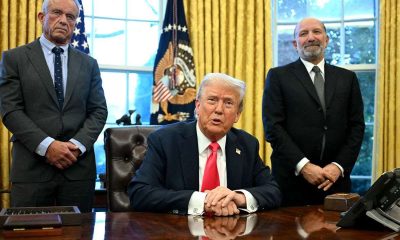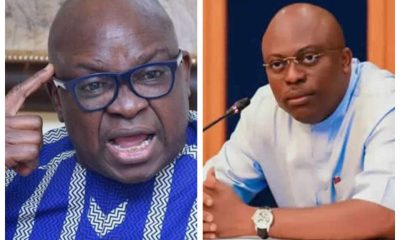Politics
Tax Bills: NASS members break rank with governors against reforms

When, following the introduction of four tax bills by President Bola Tinubu, northern governors, and key traditional rulers from the region, met at the Kashim Ibrahim House in Kaduna on October 28, to vehemently oppose the bills, it had seemed dead on arrival
However, as national assembly prepares to debate the bills in the coming days – what many say could potentially pit the north against the south – their opposition has significantly weakened as more voices have risen in support of the bills in the region and across the country. The governors, it was gathered, have resorted to strong arm tactics to force lawmakers from their states to oppose the bills.
Northern senators, such as Kawu Samaila of Kano South District and Ali Ndume of Borno South District, have been the leading opposition voices to the bills at the red chamber, but Business Hallmark gathered that intense lobbying by the presidency has broken the ranks of the lawmakers from the North with a good number, especially within the North Central backing the proposals, a development that has angered the governors, who have refused to shift grounds, and have resorted to threats.
“Some of these governors are threatening members from their states. They have even gone far to threaten that they would deny members a return ticket in 2027 if they support the bills.” said Philip Agbese, deputy spokesman of the House of Representatives, at the redemption of plenary last week.
Agbese maintained, however, that despite the threats, members of the house, including its leadership under Hon. Tajudeen Abbas, had resolved to support President Bola Tinubu’s Tax Reform Bills.
“As far as we are concerned in the House of Representatives, nobody can stop us from supporting President Bola Tinubu from rebooting the economy to work for the country,” he said. “We are united across party lines to make sure the country works. This is the disposition of Speaker Tajudeen Abass.”
Although the new proposal seeks to address the anomaly of crediting Lagos for VAT generated from consumption in other states of the federation, the northern governors argue that allowing states to retain 60 percent of VAT generated from their domains would still favour states with more economic activities and remove a substantial amount of what comes into the federation account for the benefit of all the states.
Business Hallmark had reported last week that the governors had refused to shift ground and were actively rallying lawmakers from the region to reject the bills in their present from.
Inuwa Yahaya, Gombe State governor and chairman of the Northern States Governors’ Forum, for instance, had maintained that the position of the state chief executives on the Tax Reform Bills remains unchanged because the proposed law would have dire economic consequences on the region.
“Any tax policy should be fair, inclusive and considerate of the diverse economic realities across the country,” Governor Yahaya, through his spokesperson, Isma’ila Uba Misilli, told The Leadership.
Continuing, he had said, “The proposals are seen as detrimental to the interests of the North and other sub-national entities, especially the proposed shift to a derivation-based model for distributing Value Added Tax (VAT). This is because companies remit VAT based on the location of their headquarters or tax offices rather than where goods and services are actually consumed.”
Of the four tax bills forwarded by President Tinubu to the national assembly, which stemmed from the recommendations of the Presidential Committee on Fiscal and Tax Reforms headed by Mr. Taiwo Oyedele, it is the Value Added Tax (VAT) section of the Nigeria Tax Bill 2024, which is expected to provide the fiscal framework for taxation in the country, that has rilled up the northern governors and a number of stakeholders from the region.
The bill proposes the removal of VAT from the Federal Account Allocation Committee (FAAC). Charged on consumption of goods and services, VAT under the current system, is distributed 20 percent based on derivation; 30 percent based on population of the states, while the remaining 50 percent is shared equally among all states.
The sharing formula means that while Lagos generates more than half of the total at 55 percent, it gets almost same share as Kano, which on paper has more population, but generates only 1.4 percent of the VAT. The bills, thus seek to correct this presumed anomaly by ensuring that 60 percent of the VAT will go the state of collection, as a way of rewarding states for generating more economic activities.
But the proposal has come with its own controversies, and continues to be viewed by those who oppose the bills as an attempt to cheat other states in favour of Lagos, where most of the companies in Nigeria have their headquarters and remit VAT, even though a chunk of the consumption takes place in other states.
Speaking during the convocation ceremony at Skyline University in Kano recently, Senator Rabiu Kwankwaso, the New Nigeria Peoples Party (NNPP) presidential candidate in the 2023 election, alleged, in reference to the proposed laws, that there’s an effort by Lagos to “colonize” Northern Nigeria.
He argued that young men from Lagos are planning to collect taxes paid by people from Kano and other parts of the north and take them to Lagos.
“Today, we are aware that the Lagos young men are working so hard to impose taxes and take away our taxes from Kano and this part of the country to Lagos. Even the telephones that we make or register here in Kano, efforts are there to take all the taxes to Lagos,” he said.
“Even our sons and daughters, who have brought factories — many of them here in Kano and northern Nigeria — and even banks, somehow, they are forced to take their headquarters to Lagos because taxes will now have to go to Lagos.”
A certain Chris Okafor, in a piece that went viral recently, made similar arguments. Okafor contended that ceding 60% of the VAT to the state of collection sounds attractive, but it gives undue advantage to Lagos and Ogun States, where most companies are headquartered, to the detriment of other states.
“The registered address of First Bank in CAC or FIRS is 35 Marina Lagos. However first bank has 15 branches in Anambra. In the course of rendering bank services, First bank collects VAT from its branches. But the way it is right now, the VAT collected from the 15 branches of first bank in Anambra is credited to Lagos because it is the registered office of first bank. Thus, if First bank collects N500m as VAT from Anambra, 60% of it under derivation will go to Lagos. And this is replicated in the other states in Nigeria,” he argued in the piece.
“MTN has its registered office in Lagos. But as at 2021, it had about 3m voice subscription in Anambra. MTN collects VAT from the telecom services rendered to about 3m subscribers in Anambra on daily basis. Let’s say it collects N700m monthly from Anambra subscribers, MTN credits this amount it collects to Lagos state. And by the reform bill, Lagos will collect 60% of it.”
However, Mr. Oyedele chairman of the reforms committee had explained that under the proposed formula, VAT will be remitted to states where consumption takes place, not where the headquarters of the company that produce the consumed goods is located, as is currently the case, which explains why Lagos, which hosts most of the manufacturing companies in the country, accounts for more than half of all VATs generated.
“Take for instance, almost all the banks are headquartered in Lagos. They pay the VAT in Lagos. The beverage companies: Nigeria Breweries, Coca-Cola and so on, sell beverages across Nigeria but they file in Lagos. That VAT that is remitted in Lagos is attributed to Lagos as being derived from Lagos, but it’s not derived from Lagos,” Oyedele explained during an appearance on Channels TV Hard Copy recently.
“When you make calls, it is derived from across Nigeria, which was why we thought that the hard conversation we were going to have was convincing Lagos State to accept this our new method that says, ‘move away from where VAT is remitted to where the consumption takes place.’
Every state in Nigeria would use mobile phone. They will use airtime. They will buy soft drinks. They will use cement. They’re building houses everywhere. Dangote will remit the VAT in Lagos. So we said, let’s correct this distorted derivation so it reflects economic activities everywhere those activities take place for the purpose of sharing.”
Oyedele further contended that reverting to the proposed new system will not be as complicated as it may appear because before now, companies were filing returns everywhere, and those companies within their system can tell you where the transactions are taking place.
“MTN will tell you where the subscribers are based,” he said. “If you have Coca-Cola – and it can be any company – in five minutes, you can tell you where their distributors are based and how much goods they’ve sent to them. So rather than saying, because the company producing the beverages is headquartered in Lagos, that’s where we derive all this stuff from in Nigeria, we’ll say, where did you send them to? The one you sent to Ekiti, to Zamfara, to Kebbi, to Abia. Let them take credit for their economic activities.”
Oyedele argued that apart from Lagos, every other state ought to welcome the new proposal. However, his argument has not convinced everyone, particularly northern governors, who fear, regardless, that removing 60 percent of VAT from FAAC, if the proposal scale through, could lead to reduction of the revenues they collect from the federal pool, and thus had begun to mobilize lawmakers from the region to reject the proposal.
North Divided
Although it initially presented a seeming united front in its opposition to the bills, more northern voices have recently backed the bills, while calling out the governors, even as a section of the region has broken ranks with the hardliners.
A policy analyst and former Managing Director of NAHCO Free Trade Zone, Baba Yusuf, recently expressed disappointment in the Northern governors’ position, describing it as a transactional approach that prioritizes short-term gains over long-term progress.
“I am disappointed with the mindset and outlook of the Northern elite, particularly the Northern governors. Their approach is highly transactional rather than strategic. I advocate for resource allocation based on derivation, as it drives productivity. This rent-seeking and commission-collection attitude cannot move us forward; it will only push out those who have no business in government,” he said.
“Leaders must adopt a mindset of value creation, protection, and innovation to effectively guide their people. With all due respect, there should be some forward-thinking among them. In my view, the opposition to the tax reform bill is not in the best interest of Northerners or Nigerians.”
Similarly, Shehu Sani, former Kaduna Central Senator argued that contrary to the position of the governors, the tax bills are not inimical to the north or any part of the region.
The former lawmaker noted that most of those who oppose the bills have not read them and are, therefore, doing so out of ignorance.
“The Tax reform Bill is not inimical to the North or any part of this country. It is in fact economically beneficial and fair to all parts. People should keep aside sentiments and read the Bill carefully,” he said.
“It’s a comprehensive and bold move to harmonize and simplify tax administration and streamline its operations and enforcement.The Bill will actually generate and safeguard more revenue to the states. It will also combat the corruption in the so called tax waivers granted to business cabals.
“There is nowhere in the document where any region will be short changed or taxes will be increased or jobs will be lost. Northern governors should rescind their decision to reject the bill, take time to read it and make inputs where necessary. NASS must treat this important bill with all seriousness.”
Chances of Passing
The emerging lack of cohesion with the opposing northern flank means that some lawmakers from the region may back the bill when it is presented on the floor of the national assembly. Although the assembly resumed sitting last week after an unusual two-week recess, it has yet to debate the bill on account of its polarizing nature.
The senate has 109 members, meaning that in the unlikely event that all are present, the number required to pass the tax bills is 55. And of this total, the North has 57 senators, including one from the FCT, while the South has 51 senators. But the quorum of the Senate is 37.
In the House of Representatives, where the total number is 360 members, the north accounts for 190, while the South has 170. It is expected that the south will mostly vote in favour of the bills, while a section of the north will also vote to pass it with little amendments.
During his remarks last week, the deputy spokesperson of the house, Agbese who is from Benue State in the North Central, emphasized that the lawmakers in the 10th Assembly are progressive minded and won’t cling to sectional interests.
“The difference between the new crops of politicians in the House of Representatives is that we are intellectually sound, progressively-minded, and pro-Nigeria,” he said.
“We were not elected by the governors but our constituents, and as far as the legislation (bills) will work for those that elected us, we will support it unequivocally, wholeheartedly, and powerfully to see the light of the day.”
Agbese added that copies of the bills have been made available to legislators to aid their understanding ahead of the second reading, predicting that it would be passed with necessary amendments.












